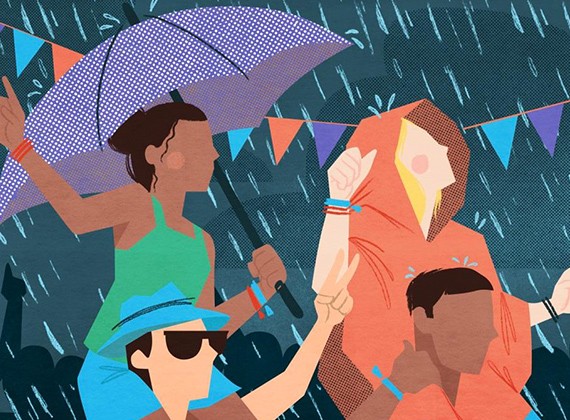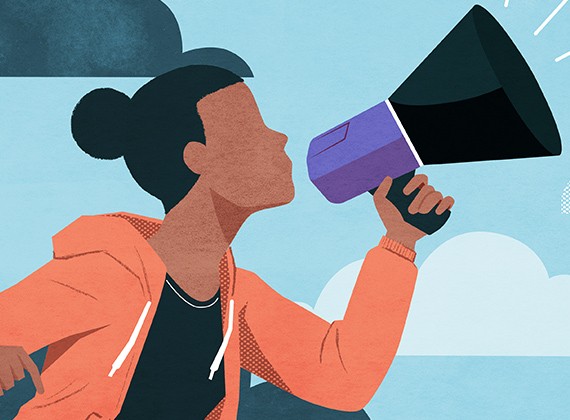

Who's who
We provide specialist NHS services across Sussex for children, young people, families and carers who are experiencing difficulties with their emotional, psychological and mental health. We have teams of staff across Sussex and in the community who can help you and your family to get the support that you need.
Who works in Sussex CAMHS and Sussex ChYPS?
Arts and creative therapies are treatments which involve using arts-based activities in a therapeutic environment, with the support of a qualified and trained mental health professional. You don’t need to have done these activities before, or have any particular skills or knowledge. In fact, you don’t even have to be good at art to do art therapy!
Different people will have different experiences of arts and creative therapies, but they all aim to:
- give you a safe time and place with someone who won’t judge you
- help you make sense of things and understand yourself better
- help you explore complicated feelings and find ways to live with them
- help you communicate and express yourself, which might include feelings or experiences you find hard to put into words
- Sometimes it helps when you can’t find the words to describe things
- Art therapists may use other materials such as clay, collage and doodling
Child and Adolescent psychotherapy is a treatment which helps the child or young person to make sense of and process difficult or confusing thoughts and feelings by exploring memories and experiences within the context of a safe therapeutic relationship. This therapy can help young people understand their self-beliefs and have a positive effect on their emotions, thought processes, behaviours, and relationships.
Most of our nurses are specialist mental health nurses. We also have some general nurses and learning disability nurses with experience of working with mental health. Our nurses have a number of skills and many have completed additional training in assessing and treating both physical and mental health needs. They offer a range of therapeutic interventions ranging from emotional support, practical guidance and developing coping strategies. Some nurses may also prescribe medication to best meet your needs. Nurses can also have additional training in providing specific psychological treatments such at Cognitive Behaviour Therapy or family work.
Our occupational therapists work with young people to help them achieve their goals by participating in meaningful activities to improve their overall well-being and help them to cope more effectively with everyday life such as school, play/leisure and daily living.
Pharmacists and pharmacy technicians are healthcare professionals who practice in a pharmacy, and focus on safe and effective medication use. A Child and Adolescent Pharmacist works with other CAMHS healthcare professionals, young people and their families to better understand prescribed medication and to provide appropriate, balanced information and advice on medications used by patients working with CAMHS.
The Primary Mental Health Work service (PMHW) offers brief, evidence-based support for young people and their families through group work, direct one to one work and wellbeing information sessions. Our aim is to support young people with moderate mental health difficulties to access resources and skills to reduce the need for longer term, more intensive interventions. We also provide training to professionals on a variety of topics around mental health and working with young people and families with mental health difficulties.
A Child and Adolescent psychiatrist is a medical expert who works in a CAMHS team.
We use our skill set to ensure the best care for children and their families.
We have knowledge and training in child development, physical health, pharmacology (medication), adult mental health and a range of other therapies, including family therapy and different individual therapies. Some of us will have additional training in those therapies. We work with children, young people, families and other professionals.
In our clinical role as doctors we carry out complex clinical assessments with team members and will look at information from other sources to help us all have a better understanding of you/your child’s difficulties. We always think that parents/carers are the experts on their own children and will look to work with you to have a better understanding of your young person’s mental health needs. We look to be able to identify any treatable mental health condition or developmental issues. Parents/carers are able to provide the context needed for change and we hope to be a catalyst for this. Where there is a clinical or medical diagnosis we are able to assess and advise on treatments including medication where appropriate. We sometimes consult with or advocate with other agencies (schools, social care, housing etc.) when they are more able to provide appropriate support needed.
Clinical and Counselling Psychologists are trained to assess and support children, young people, families and carers with mental health difficulties by using a range of individual, family and group approaches.
Psychologists mainly use therapies that involve conversation, written and creative materials or play to understand and help young people, their families and support networks to achieve their goals, and make changes that improve their health and wellbeing. Often psychologists use standardised questionnaires and the views of family, school and other supporters to help develop a shared understanding of the difficulties that brought them to CAMHS.
Psychologists are trained to work in line with children, young people and family’s preferences for change, supporting young people and their parents/carers to develop skills and approaches that are suited to their particular circumstances and family culture.
We have a good knowledge of legal frameworks around children, for example for children with more severe mental health problems we are approved doctors under the Mental Health Act and can be part of a team that decides whether admission necessary.
Part of our wider role is in research, teaching and training, particularly the future medical work force, so there may be junior doctors or medical students in the clinic. We are also part of leadership teams in the trust and will lead on quality improvement activities as part of improving service design and delivery in our teams and areas. Some of us will have specific roles and responsibilities within and outside of the trust for example as a Safeguarding Children Lead. Some of us may be involved in regional national work to improve services.
Social workers can be employed by any team within our Children and Young People’s Services (ChYPS). They are usually employed as primary mental health workers or as mental health practitioners.
Social workers work as part of a multidisciplinary team providing assessment and intervention and liaison with partner agencies. They work to the principles of social justice, human rights and respect for diversity and have specialist knowledge of safeguarding policies and procedures so are able to provide safeguarding advice to colleagues.
They also have an important role in ensuring practice is fair and that interventions are provided in positive partnership with children and their families to ensure that patients feel empowered to have influence over their own recovery.
In the urgent help service and in-patient services they provide support and care to young people and their families and can also support young people in their homes.
Support workers work alongside and with a young persons’ main clinician, to provide additional help and support both practically and emotionally. They will often see a young person and families at home, at school or in the community to help them achieve specific goals as part of the care plan.
Family/Systemic Therapy provides a safe and reliable space for family members, regardless of ethnicity, race, culture, sexuality and faith, to think and talk about their relationships in order to promote a confidence in everyday living. Strengths and weaknesses might be discussed so that changes can be made to improve the experiences of all family members including the wider family and friends. Careful thought is given to what is spoken about so that the conversation is seen as helpful and as offering a way forward into the future.

